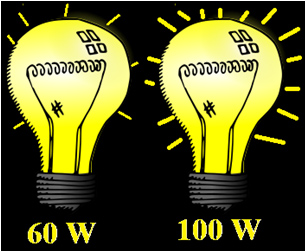
Adapted From: Incandescent light bulb, rgesthuizen, Open Clip Art Library
Power is the rate of energy transfer, or the rate at which work is done. Power is a scalar quantity, meaning it has magnitude only.
Formulas for power are:
If we play with the formula a little:
P = W/Δt Definition of power
P = Fd/Δt From module 3 lesson 1, work = Force x displacement, W = Fd
P = F(d/Δt) Factor out the Force
P = Fv From module 1 lesson 2, velocity is displacement over time v = d/Δt
Close
The metric unit of power is the Watt (W).
1 watt = 1 Joule/second (Remember: 1 Joule = 1 Newton • meter)
The watt is a small unit, so you will often see power ratings in kilowatts.
1 kilowatt = 1,000 watts
You might sometimes see power rating for motors in horsepower (hp).
1 horsepower = 746 watts

Adapted From: Incandescent light bulb, rgesthuizen, Open Clip Art Library
A 100 Watt light bulb transfers electrical energy into heat and light faster than a 60 Watt light bulb, and therefore shines brighter.
A 500 hp engine transfers the chemical energy in gasoline into kinetic energy faster than a 300 hp engine, so a car with a 500 hp engine can accelerate from 0 – 20 m/s faster than the same car with a 300 hp engine.